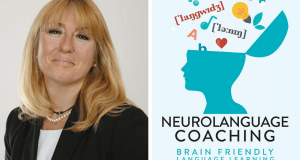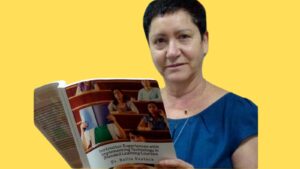Phil Wade Interviews: Hada Litim
Hada Litim first started teaching in London in 1997 and moved to Saudi Arabia in 2002 where she first taught young learners in international schools and then adults at the British Council. As well as teaching a range of general and academic English courses, Hada has also been a teacher trainer for several years. She has worked on a number CELTA courses over the past year. She previously moderated the award winning weekly #ELTchat and regularly takes part in online ELT discussions.
1) You work in Saudia Arabia teaching all female classes. How does this affect what you can teach and how?
Teaching all-women classes is great! Teaching in Saudi Arabia is great too!
In terms of content due to my geographical context, I’m not really limited to anything. Where I work we use New Cutting Edge and with IWBs and internet access, the possibilities are endless.
Phil Wade Interviews: Rob Howard
Teaching women only limits me only as far as women’s interests – but the women I teach are from very different backgrounds ranging from the young high school graduate who wants to do a first degree in English to the business owner who needs it for work. I also teach housewives, scientists, lecturers, basically women across the board, So the choice of material is often based on their interests and as you can see, that could be anything.I have taught lessons whose topics included some of the PARSNIPS in the past and it hasn’t been a problem.
2) What are your thoughts on the idea of ‘international English’ i.e. English without the British culture element taught abroad and used abroad? Or should teachers, no matter where they are, always incorporate British and American culture?
There are some course books out there which predominantly push one culture and this becomes boring. Because I work for the British Council, one could assume that students go there expecting the British culture to be used as the main model and to be honest, students tend to like it when that’s the case. But in my opinion, there should be a balance of world views in today’s classroom. This would be a fairer reflection of English language users across the globe.
Phil Wade Interviews: Matthew Armstrong
3) You told me that you are interested in holistic and authentic teaching. Can you explain why these are important to you and how you go about putting them into practice?
I think I’ve always been a people’s person. I enjoy communicating with people and gain real pleasure spending time really getting to know people and understanding them. So, I guess, I naturally took this into the classroom. When I first started teaching, post CELTA, I was reluctant. Everything was textbook and my own shortcomings and weaknesses as a teacher meant I let that go a bit. But as I progressed and became a more confident teacher, I relaxed and this natural instinct slowly resurfaced in the classroom. I’d gone through a stage when I was getting complaints from time to time and I just couldn’t understand it. But, since I’ve relaxed and allowed myself to really be me, the complaints seem to have subsided and I too seem to enjoy teaching a lot more.
Ron Morrain – Phil Wade Interviews
I think the main thing I do differently is never look at my students as students but make a conscious effort to recognize them as people from the word go. So besides the more personal and personalized needs analysis and periodic counselling I do with them, I also listen to my students more.
4) You say your teaching can be labelled as principled eclecticism. Does this mean that you mix and match different methods and hope they fit together and form a cohesive lesson?
Exactly. This too came with experience and lots of education. Not just through training but also continuous development. This knowledge is essential to be able to make spontaneous decisions in the classroom and still land on one’s feet. Adhering to that mindset enables me to be flexible and not think twice about it. I think I used to unplug my teaching before I even knew there was a term for it. My best lessons are seldom planned but they definitely draw what the students bring to the class and my own experiences.
5) What do you think of the idea that we must all develop our own method or approach and that learning methods and then mixing them are just the first and second steps to this objective?
I don’t know if I’d go as far as saying ‘we must all develop our own method’, but certainly, teachers who can do that are definitely very fortunate. I say this as I’m aware not every teacher is given the time and freedom to develop professionally and/or experiment in the classroom. And both these would be necessary to develop one’s own approach based on sound principles.
6) I know that you do a lot of needs analysis in order to find out as much as you can about your students. Can you give some examples of important information you collected and how you utilised it?
The information I collect is basically of two types:
- First, personal, and this is the information that helps me connect with my students and show them that I am genuinely interested in them. I may use this info casually by mentioning something I know about a student during a lesson. Or I may select a text based on the fact that a couple of students have a connection to the topic. I may also approach the student in private and let her know that I remember she’d mentioned ‘the info’ and I wondered how she was doing. Basically, humanizing the context and building a level of trust between us.
- The other information I collect is purely linguistic. So next to each student’s name, I have a whole bunch of coded notes based on the student’s four skills. These notes help me plan as well as correct the student but also observe the progress, or lack thereof. It’s also always interesting to the student to show them things they said or did at different stages in the course and how that’s either changed, or not.
7) Your next adventure seems to be CELTA teacher training. If I was a potential CELTA student and comparing it to other recognised and not so recognised but cheaper courses, how would you convince me to do the CELTA, given that it is not compulsory in every country and you can get by either without it or with another certificate?
I don’t think there is any other course out there apart from the Cambridge CELTA or the Trinity Cert. that can give the participant the same level of input, teaching practice and feedback. The course I recently completed included a few trainees who’d taken a TEFL course before and then completed CELTA. They were the first to say that there was no comparison. Admittedly, there’s been a lot of talk about a CELTA makeover, but thus far, nobody has come up with a feasible format or one that would be as accessible as it currently is.







